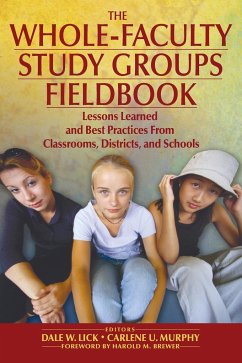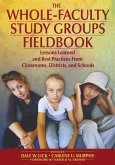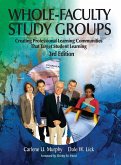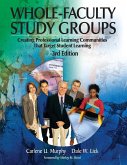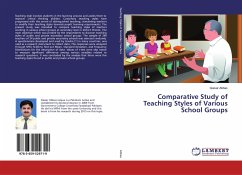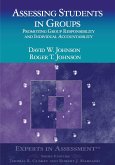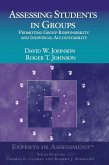Dale W. Lick, Carlene U. Murphy
The Whole-Faculty Study Groups Fieldbook
Lessons Learned and Best Practices From Classrooms, Districts, and Schools
Dale W. Lick, Carlene U. Murphy
The Whole-Faculty Study Groups Fieldbook
Lessons Learned and Best Practices From Classrooms, Districts, and Schools
- Gebundenes Buch
- Merkliste
- Auf die Merkliste
- Bewerten Bewerten
- Teilen
- Produkt teilen
- Produkterinnerung
- Produkterinnerung
In this practical guide, an experienced group of contributors provide concrete strategies and real-world examples for implementing this highly successful design for professional learning communities.
Andere Kunden interessierten sich auch für
![The Whole-Faculty Study Groups Fieldbook The Whole-Faculty Study Groups Fieldbook]() Dale W. LickThe Whole-Faculty Study Groups Fieldbook44,99 €
Dale W. LickThe Whole-Faculty Study Groups Fieldbook44,99 €![Whole-Faculty Study Groups Whole-Faculty Study Groups]() Carlene U. MurphyWhole-Faculty Study Groups93,99 €
Carlene U. MurphyWhole-Faculty Study Groups93,99 €![Whole-Faculty Study Groups Whole-Faculty Study Groups]() Carlene U. MurphyWhole-Faculty Study Groups43,99 €
Carlene U. MurphyWhole-Faculty Study Groups43,99 €![Interest Groups and Education Reform: The Latest Crusade to Restructure the Schools Interest Groups and Education Reform: The Latest Crusade to Restructure the Schools]() Veronica Donahue Is a. Manager DicontiInterest Groups and Education Reform: The Latest Crusade to Restructure the Schools101,99 €
Veronica Donahue Is a. Manager DicontiInterest Groups and Education Reform: The Latest Crusade to Restructure the Schools101,99 €![Comparative Study of Teaching Styles of Various School Groups Comparative Study of Teaching Styles of Various School Groups]() Qaisar AbbasComparative Study of Teaching Styles of Various School Groups36,99 €
Qaisar AbbasComparative Study of Teaching Styles of Various School Groups36,99 €![Assessing Students in Groups Assessing Students in Groups]() David W. JohnsonAssessing Students in Groups39,99 €
David W. JohnsonAssessing Students in Groups39,99 €![Assessing Students in Groups Assessing Students in Groups]() David W. JohnsonAssessing Students in Groups83,99 €
David W. JohnsonAssessing Students in Groups83,99 €-
-
-
In this practical guide, an experienced group of contributors provide concrete strategies and real-world examples for implementing this highly successful design for professional learning communities.
Produktdetails
- Produktdetails
- Verlag: Corwin
- Seitenzahl: 336
- Erscheinungstermin: 26. Juli 2006
- Englisch
- Abmessung: 260mm x 183mm x 23mm
- Gewicht: 830g
- ISBN-13: 9781412913249
- ISBN-10: 1412913241
- Artikelnr.: 22385597
- Verlag: Corwin
- Seitenzahl: 336
- Erscheinungstermin: 26. Juli 2006
- Englisch
- Abmessung: 260mm x 183mm x 23mm
- Gewicht: 830g
- ISBN-13: 9781412913249
- ISBN-10: 1412913241
- Artikelnr.: 22385597
Carlene U. Murphy began her 47th consecutive year of work in public schools in September 2004. She is Director of the National WFSG Center in Augusta, Georgia. She began her teaching career as a fourth-grade teacher in August 1957 in her home-town of Augusta. After 1 year of living at home and teaching, she decided to spread her wings and went to Memphis, Tennessee, where she would teach the fourth grade for 13 years. It is the children she taught in Memphis that she sees in her minds eye today as giving her the energy and love for what she continues to do. Returning to Augusta to begin the 19711972 school year, she was a classroom teacher for 2 more years before moving into administrative positions. She developed the programs for gifted children in the Richmond County school system and administered those programs for 5 years before becoming director of staff development in 1978. During the 15 years as direc-tor of staff development, she also designed and administered the districts Adopt-A-School program that received national recognition, and she assumed responsibilities for the districts public relations functions, including publications and coordinating special events. The 15 years (19781993) as the Richmond County (Augusta) School Districts director of staff development brought many accolades to the district and to Murphy. In 1991, Richmond County received the Award for Outstanding Achievement in Professional Development from the American Association of School Administrators. The district also received Georgias Outstanding Staff Development Program Award for 2 consecutive years. In 1992, she was awarded the National Staff Development Councils Contributions to Staff Development Award, one of the organizations highest honors. She was the first practitioner to receive that honor. Her personal ser-vice to the National Staff Development Council included serving as chairperson of the annual national conference in Atlanta in 1986, as president in 1988, and on the board of trustees from 1984 to 1990. After retiring from the Richmond County schools in 1993, she worked through 1997 as a private consultant for the schools and districts that wanted to implement the process that she would name Whole-Faculty Study Groups (WFSGs). She has written extensively about her work in Educational Leadership and the Journal of Staff Development. From the summer of 1997 to December 2002, Murphy worked as a full-time consultant with ATLAS Communities. She worked withall ATLAS schools in the implementation of WFSGs. She also continued to work with schools not associated with the national comprehensive school reform design.
Dale W. Lick is past president of Georgia Southern University, the University of Maine, and Florida State University, and he is currently a university professor in the Learning Systems Institute at Florida State University. He teaches in the Department of Educational Leadership and Policy Studies and works on educa tional and organizational projects involving transformational leadership, change creation, leading and managing change, learning teams, learning organizations, distance learning, new learning systems (e.g., the HyLighter Learning and Assessment Systems), strategic planning, and visioning. A mathematician by academic training, Lick previously held administrative and faculty positions at the Port Huron Junior College, University of Redlands, University of Tennessee, Drexel University, Russell Sage College, and Old Dominion University. He also served as a visiting research mathematician at Brookhaven National Laboratory, an adjunct professor of biomathematics at Temple University, and a scientific consultant to the U.S. Atomic Energy Commission. Included in 45 national and international biographical listings, Lick is the author of four books; more than 60 book chapters, professional articles, and proceedings; and 285 original newspaper columns. His recent books are Whole-Faculty Study Groups: A Powerful Way to Change Schools and Enhance Learning and Whole-Faculty Study Groups: Creating Student-Based Professional Development (both with Carlene Murphy), and New Directions in Mentoring: Creating a Culture of Synergy (author and coeditor with Carol Mullen). Recent publications are Mega-Level Strategic Planning: Beyond Conventional Wisdom and Change Creation: The Rest of the Planning Story (both with Roger Kaufman), Chapters 1 and 2 in the book Technology-Driven Planning: Principles to Practice; Whole-Faculty Study Groups: Facilitating Mentoring for School-Wide Change, Theory Into Practice; Leadership and Change, Chapter 3 in A Field Guild to Academic Leadership (edited by Robert Diamond); and Medieval Scholarship Meets 21st Century Learning Technology, Part One: The Collaborative Annotation Model and Part Two: The Interactive Annotation Model (both with David Lebow), Online Classroom. Lick received both bachelors and masters degrees from Michigan State University and a Ph.D. from the University of California at Riverside. He holds all three levels of formal training and certification for Leading and Managing Organizational Change: Change Knowledge, Instructor/Trainer, and Consultation Skills, from the international change research and development organization, Conner Partners (formerly ODR, Inc.), Atlanta, Georgia. He also completed formal programs on The Seven Habits of Highly Effective People (Stephen Covey) and Learning Organizations (Peter Senge).
Dale W. Lick is past president of Georgia Southern University, the University of Maine, and Florida State University, and he is currently a university professor in the Learning Systems Institute at Florida State University. He teaches in the Department of Educational Leadership and Policy Studies and works on educa tional and organizational projects involving transformational leadership, change creation, leading and managing change, learning teams, learning organizations, distance learning, new learning systems (e.g., the HyLighter Learning and Assessment Systems), strategic planning, and visioning. A mathematician by academic training, Lick previously held administrative and faculty positions at the Port Huron Junior College, University of Redlands, University of Tennessee, Drexel University, Russell Sage College, and Old Dominion University. He also served as a visiting research mathematician at Brookhaven National Laboratory, an adjunct professor of biomathematics at Temple University, and a scientific consultant to the U.S. Atomic Energy Commission. Included in 45 national and international biographical listings, Lick is the author of four books; more than 60 book chapters, professional articles, and proceedings; and 285 original newspaper columns. His recent books are Whole-Faculty Study Groups: A Powerful Way to Change Schools and Enhance Learning and Whole-Faculty Study Groups: Creating Student-Based Professional Development (both with Carlene Murphy), and New Directions in Mentoring: Creating a Culture of Synergy (author and coeditor with Carol Mullen). Recent publications are Mega-Level Strategic Planning: Beyond Conventional Wisdom and Change Creation: The Rest of the Planning Story (both with Roger Kaufman), Chapters 1 and 2 in the book Technology-Driven Planning: Principles to Practice; Whole-Faculty Study Groups: Facilitating Mentoring for School-Wide Change, Theory Into Practice; Leadership and Change, Chapter 3 in A Field Guild to Academic Leadership (edited by Robert Diamond); and Medieval Scholarship Meets 21st Century Learning Technology, Part One: The Collaborative Annotation Model and Part Two: The Interactive Annotation Model (both with David Lebow), Online Classroom. Lick received both bachelors and masters degrees from Michigan State University and a Ph.D. from the University of California at Riverside. He holds all three levels of formal training and certification for Leading and Managing Organizational Change: Change Knowledge, Instructor/Trainer, and Consultation Skills, from the international change research and development organization, Conner Partners (formerly ODR, Inc.), Atlanta, Georgia. He also completed formal programs on The Seven Habits of Highly Effective People (Stephen Covey) and Learning Organizations (Peter Senge).
Foreword by Harold M. Brewer Preface Acknowledgments About the Contributors About the Editors Part I: Getting Started 1. Introducing Whole-Faculty Study Groups - Carlene U. Murphy and Dale W. Lick 2. Applying the Whole-Faculty Study Groups Framework in Schools - Ann Proctor 3. Aligning Whole-Faculty Study Groups With Staff Development Standards - Michael Murphy Part II: Leadership and Sponsorship 4. Enhancing the Principal
s Instructional Leadership Role - J. Patrick Mahon 5. Strengthening School Improvement Plans Through District Sponsorship - Anita Kissinger 6. Partnering With Teacher Unions for School Improvement - Adam Urbanski and Xochitl Perez Castillo Part III: Study Groups and Learning Communities 7. Answering the Question: Do Professional Learning Communities Really Work? - Andrew E. Koenigs 8. Establishing Student Study Groups - Robin P. Cooper and Gwendolyn Baggett 9. Implementing Study Groups for Principals - Emily Weiskopf Part IV: Key Success Elements 10.The Whole-Faculty Study Groups Rubric: Defining Context, Process, and Content - Carlene U. Murphy 11. Building Commitment - Kenneth Sherman and Kim Reynolds-Manglitz 12. Using Study Groups for Cultural Change in Schools - Michael L. Rothman and Ronald E. Walker 13. Changing School Culture - Jill Potts and Jeff Zoul 14. Using Data to Improve Achievement in Mathematics - Teri Roberts 15. Making Data-Based Decisions for School Success - Karl H. Clauset, Sherman H. Parker, and Marcia R. Whitney Part V: Instructional Strategies 16. Improving the Quality of Student Performance - Steve Keyes 17. Implementing Instructional Strategies - Terri L. Jenkins and Lynn K. Baber 18. Implementing Reading and Mathematics Programs - Julie J. Nall 19. Enhancing Performance in the English Language Arts - Charlotte Ann Buisson 20. Raising Student Achievement in Reading and Mathematics - Lisa S. Smith 21. Improving Reading in Primary Grades - Angela S. Dillon Part VI: Perspectives for Teachers and Teaching 22. Increasing Teacher Learning to Improve Student Learning - Beverly S. Strickland 23. Changing Teachers
Beliefs About Students and Learning - Danette R. Smith 24. Creating School Successes: A Teacher
s Point-of-View - Beverly A. Gross 25. Planning and Implementing Strategies for School Improvement - Emily Weiskopf 26. Activating a Professional Teacher Evaluation Model - Jill Potts and Jeff Zoul Part VII: State and National Initiatives 27. Going Statewide With Whole-Faculty Study Groups in Louisiana - Teri Roberts 28. Developing and Supporting Leaders: A New Day, A New Way With New Results - Deb Page and Gale Hulme 29. Improving Schools Through Statewide Collaboration - Stephen M. Preston 30. Establishing a Support Network: The National Whole-Faculty Study Groups Center - Carlene U. Murphy Part VIII: An Overview of School Reform 31. Improving Schools: Seeing the Big Picture - Dale W. Lick and Carlene U. Murphy References Action Research--Related Sources Index
s Instructional Leadership Role - J. Patrick Mahon 5. Strengthening School Improvement Plans Through District Sponsorship - Anita Kissinger 6. Partnering With Teacher Unions for School Improvement - Adam Urbanski and Xochitl Perez Castillo Part III: Study Groups and Learning Communities 7. Answering the Question: Do Professional Learning Communities Really Work? - Andrew E. Koenigs 8. Establishing Student Study Groups - Robin P. Cooper and Gwendolyn Baggett 9. Implementing Study Groups for Principals - Emily Weiskopf Part IV: Key Success Elements 10.The Whole-Faculty Study Groups Rubric: Defining Context, Process, and Content - Carlene U. Murphy 11. Building Commitment - Kenneth Sherman and Kim Reynolds-Manglitz 12. Using Study Groups for Cultural Change in Schools - Michael L. Rothman and Ronald E. Walker 13. Changing School Culture - Jill Potts and Jeff Zoul 14. Using Data to Improve Achievement in Mathematics - Teri Roberts 15. Making Data-Based Decisions for School Success - Karl H. Clauset, Sherman H. Parker, and Marcia R. Whitney Part V: Instructional Strategies 16. Improving the Quality of Student Performance - Steve Keyes 17. Implementing Instructional Strategies - Terri L. Jenkins and Lynn K. Baber 18. Implementing Reading and Mathematics Programs - Julie J. Nall 19. Enhancing Performance in the English Language Arts - Charlotte Ann Buisson 20. Raising Student Achievement in Reading and Mathematics - Lisa S. Smith 21. Improving Reading in Primary Grades - Angela S. Dillon Part VI: Perspectives for Teachers and Teaching 22. Increasing Teacher Learning to Improve Student Learning - Beverly S. Strickland 23. Changing Teachers
Beliefs About Students and Learning - Danette R. Smith 24. Creating School Successes: A Teacher
s Point-of-View - Beverly A. Gross 25. Planning and Implementing Strategies for School Improvement - Emily Weiskopf 26. Activating a Professional Teacher Evaluation Model - Jill Potts and Jeff Zoul Part VII: State and National Initiatives 27. Going Statewide With Whole-Faculty Study Groups in Louisiana - Teri Roberts 28. Developing and Supporting Leaders: A New Day, A New Way With New Results - Deb Page and Gale Hulme 29. Improving Schools Through Statewide Collaboration - Stephen M. Preston 30. Establishing a Support Network: The National Whole-Faculty Study Groups Center - Carlene U. Murphy Part VIII: An Overview of School Reform 31. Improving Schools: Seeing the Big Picture - Dale W. Lick and Carlene U. Murphy References Action Research--Related Sources Index
Foreword by Harold M. Brewer Preface Acknowledgments About the Contributors About the Editors Part I: Getting Started 1. Introducing Whole-Faculty Study Groups - Carlene U. Murphy and Dale W. Lick 2. Applying the Whole-Faculty Study Groups Framework in Schools - Ann Proctor 3. Aligning Whole-Faculty Study Groups With Staff Development Standards - Michael Murphy Part II: Leadership and Sponsorship 4. Enhancing the Principal
s Instructional Leadership Role - J. Patrick Mahon 5. Strengthening School Improvement Plans Through District Sponsorship - Anita Kissinger 6. Partnering With Teacher Unions for School Improvement - Adam Urbanski and Xochitl Perez Castillo Part III: Study Groups and Learning Communities 7. Answering the Question: Do Professional Learning Communities Really Work? - Andrew E. Koenigs 8. Establishing Student Study Groups - Robin P. Cooper and Gwendolyn Baggett 9. Implementing Study Groups for Principals - Emily Weiskopf Part IV: Key Success Elements 10.The Whole-Faculty Study Groups Rubric: Defining Context, Process, and Content - Carlene U. Murphy 11. Building Commitment - Kenneth Sherman and Kim Reynolds-Manglitz 12. Using Study Groups for Cultural Change in Schools - Michael L. Rothman and Ronald E. Walker 13. Changing School Culture - Jill Potts and Jeff Zoul 14. Using Data to Improve Achievement in Mathematics - Teri Roberts 15. Making Data-Based Decisions for School Success - Karl H. Clauset, Sherman H. Parker, and Marcia R. Whitney Part V: Instructional Strategies 16. Improving the Quality of Student Performance - Steve Keyes 17. Implementing Instructional Strategies - Terri L. Jenkins and Lynn K. Baber 18. Implementing Reading and Mathematics Programs - Julie J. Nall 19. Enhancing Performance in the English Language Arts - Charlotte Ann Buisson 20. Raising Student Achievement in Reading and Mathematics - Lisa S. Smith 21. Improving Reading in Primary Grades - Angela S. Dillon Part VI: Perspectives for Teachers and Teaching 22. Increasing Teacher Learning to Improve Student Learning - Beverly S. Strickland 23. Changing Teachers
Beliefs About Students and Learning - Danette R. Smith 24. Creating School Successes: A Teacher
s Point-of-View - Beverly A. Gross 25. Planning and Implementing Strategies for School Improvement - Emily Weiskopf 26. Activating a Professional Teacher Evaluation Model - Jill Potts and Jeff Zoul Part VII: State and National Initiatives 27. Going Statewide With Whole-Faculty Study Groups in Louisiana - Teri Roberts 28. Developing and Supporting Leaders: A New Day, A New Way With New Results - Deb Page and Gale Hulme 29. Improving Schools Through Statewide Collaboration - Stephen M. Preston 30. Establishing a Support Network: The National Whole-Faculty Study Groups Center - Carlene U. Murphy Part VIII: An Overview of School Reform 31. Improving Schools: Seeing the Big Picture - Dale W. Lick and Carlene U. Murphy References Action Research--Related Sources Index
s Instructional Leadership Role - J. Patrick Mahon 5. Strengthening School Improvement Plans Through District Sponsorship - Anita Kissinger 6. Partnering With Teacher Unions for School Improvement - Adam Urbanski and Xochitl Perez Castillo Part III: Study Groups and Learning Communities 7. Answering the Question: Do Professional Learning Communities Really Work? - Andrew E. Koenigs 8. Establishing Student Study Groups - Robin P. Cooper and Gwendolyn Baggett 9. Implementing Study Groups for Principals - Emily Weiskopf Part IV: Key Success Elements 10.The Whole-Faculty Study Groups Rubric: Defining Context, Process, and Content - Carlene U. Murphy 11. Building Commitment - Kenneth Sherman and Kim Reynolds-Manglitz 12. Using Study Groups for Cultural Change in Schools - Michael L. Rothman and Ronald E. Walker 13. Changing School Culture - Jill Potts and Jeff Zoul 14. Using Data to Improve Achievement in Mathematics - Teri Roberts 15. Making Data-Based Decisions for School Success - Karl H. Clauset, Sherman H. Parker, and Marcia R. Whitney Part V: Instructional Strategies 16. Improving the Quality of Student Performance - Steve Keyes 17. Implementing Instructional Strategies - Terri L. Jenkins and Lynn K. Baber 18. Implementing Reading and Mathematics Programs - Julie J. Nall 19. Enhancing Performance in the English Language Arts - Charlotte Ann Buisson 20. Raising Student Achievement in Reading and Mathematics - Lisa S. Smith 21. Improving Reading in Primary Grades - Angela S. Dillon Part VI: Perspectives for Teachers and Teaching 22. Increasing Teacher Learning to Improve Student Learning - Beverly S. Strickland 23. Changing Teachers
Beliefs About Students and Learning - Danette R. Smith 24. Creating School Successes: A Teacher
s Point-of-View - Beverly A. Gross 25. Planning and Implementing Strategies for School Improvement - Emily Weiskopf 26. Activating a Professional Teacher Evaluation Model - Jill Potts and Jeff Zoul Part VII: State and National Initiatives 27. Going Statewide With Whole-Faculty Study Groups in Louisiana - Teri Roberts 28. Developing and Supporting Leaders: A New Day, A New Way With New Results - Deb Page and Gale Hulme 29. Improving Schools Through Statewide Collaboration - Stephen M. Preston 30. Establishing a Support Network: The National Whole-Faculty Study Groups Center - Carlene U. Murphy Part VIII: An Overview of School Reform 31. Improving Schools: Seeing the Big Picture - Dale W. Lick and Carlene U. Murphy References Action Research--Related Sources Index

